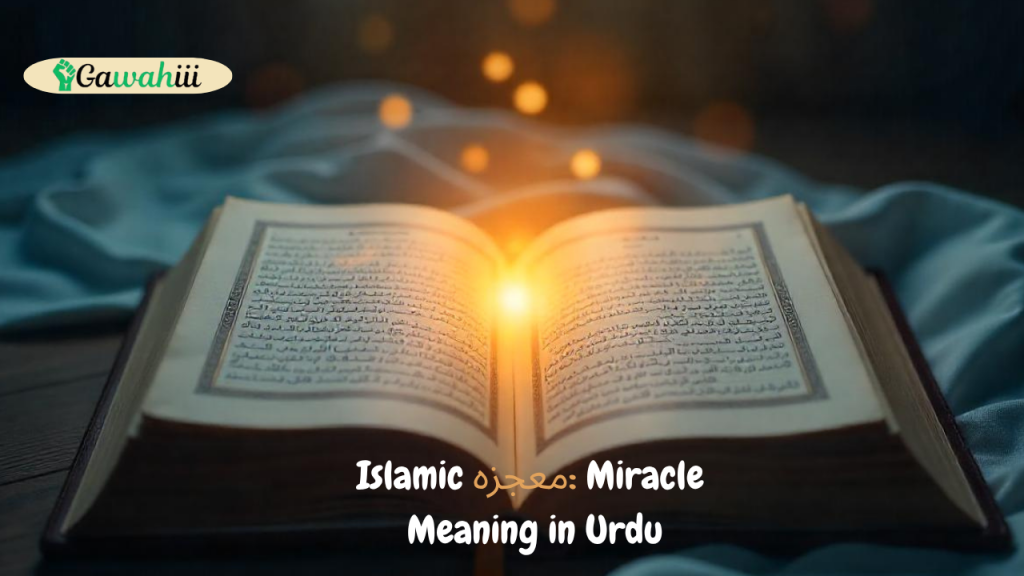Introduction
In a world where science can give answers and explain most of our reality, people can still see or hear of a part of the phenomena that goes against the natural laws. These are what are called miracles. But what exactly is a miracle all about, particularly in the Urdu language and in Islamic teachings?
The miracle word evokes the feeling of el and spiritual meaning. It is translated in Urdu as آستم. Transliteration—Mu’jiza—has a mantle-like status of the religious texts, as well as the tales of prophets, as well as the form it takes in daily experiences. We discuss the Urdu version of the meaning of “miracle” with intricate perspectives to KNOW the meaning of “miracle” in Islamic beliefs or examples in the past, of the psychological impact, and of its role in recent times. You will learn how miracles have always given hope and faith to millions and why that happens, in conclusion.
Miracle Meaning in Urdu: بنیادی زبان
In Urdu, the term “miracle” is ۞جزہ, which is translated as “Muajiza.” It refers to something extraordinary that is beyond the capacity of a human being and the forces of nature and is done by the power of Allah.
Key Aspects:
Urdu Translation Miracle = معجزہ
Definition: This is a supernatural incident that goes against the forces of nature.
- Origin: It comes from the Arabic vocabulary, the base of the word being Ajz (عجز), which means “weakness,” and it suggests that people are helpless in the face of Godly deeds.
Religious Context:
- The Prophets (Anbiya) are often declared associated with them.
- As indicators that manifested the fact in divine messages.
In Urdu Sentences Example:
- It was the miracle of God in making him survive.
- Every action of Nabi was a miraculous one.
Knowledge of this term creates a better understanding of how the divine power is viewed in the Islamic religion and Urdu cultures.
Islamic Miracles: Essential Proof of God
The prophet of Islam is an Ismaili, and Islam is a religion controlled by Allah. In Islam, the miracles are known as Mu’izat, and they are known as the sign of God bestowed upon the prophets to prove the truth of their preaching.
Core Concepts:
- Prophetic Miracles: Only the prophets can perform such miracles, which act as a sort of evidence.
- Karamat: Minor miracles that are done by the saints (Awliya) with the will of Allah.
- Mission: To aid in the truth of the Prophet and call people to the message of Islam.
Examples:
- Prophet Musa (A.S.): Rod that has become a serpent.
- Prophet Isa (A.S.): The healing of the blind and making the dead live.
- Prophet Muhammad (PBUH): The breaking of the moon, the Quran is a miracle.
Qur’anic Perspective:
- And surely we gave to Moses nine (distinct) signs…” (Quran 17:101)
- And of the son of Mary and his mother we made a sign…” (Quran 23:50)
- These miracles are used as evidence for the believers and as a test for the non-believers. They demonstrate the infinite strength of Allah.
Examples of Renowned Miracles in History
Historical records are packed with divine interventions in the form of miracles.
Comparison Table:
| Prophet Name | Miracle | Source/Reference |
|---|---|---|
| Musa (A.S.) | Red Sea separating | Quran 26:63 |
| Isa (A.S.) | Healing and raising the dead | Quran 5:110 |
| Muhammad (PBUH) | Fragmenting of the moon | Sahih Bukhari, Quran 54:1 |
| Ibrahim (A.S.) | Going out of the fire without burns | Quran 21:69 |
Significance:
- Proved Prophethood
- Stimulated people to imagine
- In many cases, it had to do with challenging the laws of nature.
- These miracles still form the core of Islamic theology, and this act brings faithful believers closer to their faith.
- There are some major distinctions between a miracle and a coincidence.
It is important to sift the grain from what is a miracle and what can be a coincidence.
Miracle:
- It is of the will of God.
- Violates the natural law
Modern Miracles: Fact or Fiction?
Many folks ponder whether miracles still exist in the modern world. The answer lies largely within someone’s belief system.
Some modern-day examples:
- A man survives a deadly accident without even a scratch.
- A child recovers from a terminal illness after a prayer.
- A town is spared from a natural disaster after collectively praying.
Believer’s perspective:
- They see these events as signs from God, in which divine mercy can be proven.
- They believe these events strengthen their faith/resolve.
Skeptic’s perspective:
- At this point they may label someone as a moron or different or ideology or coincidence or unexplained science.
In Islam, miracles sometimes still happen, and at times it’s like they do all the time. In [Islamic Culture], for instance, miracles sometimes still happen, and sometimes, often in terms of someone’s journeys, they might experience miracles, and so that might extend into the realm that falls outside logic, but they announce their beliefs as well.
A Scientific and Logical Approach to Miracles
Science has rules and is founded upon observation, experimentation, and replication. Then, when we talk about miracles, we are saying it does not fall under these adjectives at all.
Science would contend:
- It requires evidence & replication.
- As a result, refer to miracles as unexplained anomalies.
- and would have an open mind that our current science does not know so much.
Some scientists are religious and respect their positions but do not doubt that miracles can happen and see miracles as events outside of our understanding.
An interesting time:
For example, even quantum physics has broader implications than “conventional logic” and has taken leaps to define boundaries between realms of our assumptions of science and spirituality. So, that being said, using science does not, as a standard, reject miracles; it just means we can’t explain them… yet.
Psychological Dimensions of Believing in Miracles
The belief in miracles has serious implications/considerations around an individual’s mental/emotional well-being.
Advantages:
- Reduce stress during times of crisis.
- Increase patience and resilience.
- Increased spiritual awareness
Example/Case Study:
A mother from Lahore believes the survival of her son from a disease that meant no safety was possible (doctors had given up) was due to her Tahajjud prayers undertaken nightly with sincerity and her supplications in the night. Doctors were hopeless, and he eventually was healed.
Key Thought (Takeaway):
- Believing in miracles has the potential to provide hope, often a key ingredient in recovery and perseverance.
- Representation of Miracles in Urdu Literature and Urdu Poetry
- Urdu literature has an immense representation of spirituality, and often miracles are articulated in poetry and prose.
Literary Devices Available:
- Metaphor: “Dil ka zakhm bhi mu’jiza ban gaya.”
- Symbolism—the representations of miracles are often used to suggest the existence of divine love or intervention.
Well-known writers/authors include
Allama Iqbal often used the metaphor of miracles in the context of the spiritual awakening to a miraculous understanding of the divine nature of this world.
- Ashfaq Ahmed—challenged understandings around mysticism and everyday life—frequently writes about miracles.
- These pieces of literature allow readers to relate to the idea of miracles in both emotional and philosophical ways.
- Another Difficulty of the Word “Miracle” in a Common-Sense Approach
- The word “miracle” is sometimes borrowed too broadly in contemporary use, diluting its true meaning.
Here we have outlined some examples of when the term “miracle” or “miraculously” is misapplied:
- Miracle shampoos
- Miracle weight-loss pills.
- Dissipate deception in the name of religious money.
How to tell real from unreal:
- – Check if it breaches the laws of nature.
- – Is there spiritual relevance?
- – Commercial consideration is present.
Protecting the sacredness of the word allows the spiritual and religious weight to remain intact.
How to teach a child about miracles in an Urdu-speaking home
Children in their development form the basis of their spiritual understanding early in life, and teaching them about miracles creates faith.
How to teach:
- – Share Quranic stories based on miracles and add images.
- – Read books in Urdu for children that have miracle stories available.
- – Allow them to extend away from the expectation to ask questions and gently explain.
Example resources:
- – Stories of the Prophets in Urdu.
- – Animated Islamic cartoons.
Creating a nurturing space exposes them to spirituality, which is the mechanism you will need to raise children with solid emotional credentials as well as moral standing.
Frequently Asked Questions
What is the meaning of Miracle in Urdu?
Miracle in Urdu is “معجزہ” (Mu’jiza). It means an act or event that breaches the laws of nature as a demonstration of the divine.
Are there miracles in Islam?
Yes, there are miracles in Islam, and most importantly, Islam recognizes the signs of miracles, and most especially, miracles found in the prophets.
Can all people perform miracles?
No, miracles are only performed by Prophets. Saints can perform Karamat with Allah’s will.
What is the difference between a miracle and a coincidence?
A miracle is divine and breaks the natural laws, whereas a coincidence is random and completely natural.
How do we view miracles today?
They are regarded as divine, rare signs to believers, whereas non-believers see them as unexplainable events.
Conclusions
The miracle’s meaning in Urdu is more than a word; it opens up knowledge to the awareness of Allah’s divine power, it has historical significance, and it is an active individual faith that many still hold.
Miracles, from the stories of people who will forever be told in history, like our prophets of old, or where a random coincidence has happened to someone today, to something that we heard or saw that is less than a coincidence, as the doctor’s report shows recoveries with no explained explanation, miracles remind us of Allah’s divine mercy and control over all things. The fact of a miracle in Urdu culture is larger than just a word; it embodies a way of knowing that exists through faith within families and community folklore.
Let us hold the true meaning of “معجزہ” dear to our hearts and be aware of all the blessings that surround us daily.







